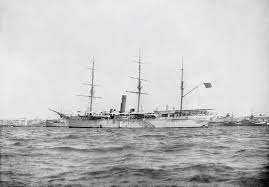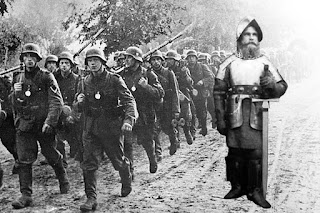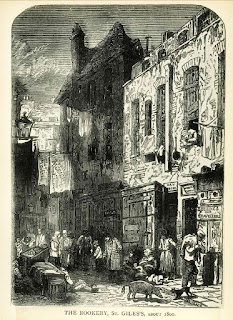Forty Minutes that Lasted Fifty Years: The Story of the 1896 Anglo-Zanzibar War the Shortest War in History
At nine in the morning on the 27th of August 1896 the British Consul’s ultimatum to the Sultanate of Zanzibar expired.
Two minutes later three battle cruisers and two gunboats of the Royal Navy backed by a contingent of one-hundred fifty Royal Marines and nine-hundred pro-British Zanzibaris begin a ferocious bombardment and assault on the Sultan’s Palace complex.
There is a brief naval engagement. The two British cruisers under the command of Admiral Harry Rawson launch an attack on the lone enemy boat that patrols the waters of Zanzibar’s harbor. The boat is a royal yacht named the HMS Glasgow and it was gifted to the island state of Zanzibar by Queen Victoria herself.
British shells cause the boat to founder and sink in the shallow waters of the harbor. The HMS Glasgow gets stuck in the mud with only its masts showing above the waterline. The sultan’s crew, servants he has forcibly staffed aboard the yacht, wave a British Union Jack flag from the masts as a sign of surrender.
 |
| The HMS Glasgow gifted by Queen Victoria |
In less than forty-five minutes all the firing is over. The would-be Sultan of Zanzibar, Khalid bin Bargash, flees his palace through a back door, with nothing more than the clothes on his back, and seeks asylum at the German Consulate.
The British, and their local allies, kill over five-hundred members of the Sultan’s Palace Guards in less than an hour and leave the entire complex, considered one of east Africa’s most stately and modern buildings, in ruins. Only one British Royal Marine is wounded during the entire attack.
The Anglo-Zanzibar War of August 27, 1896 is the shortest war in recorded history. In total the entire war took approximately forty minutes. Reports vary as to whether the actual fighting took thirty-eight minutes or if it, in fact, took a total of forty-four minutes from the time the first shot was fired at two minutes past nine in the morning until when the British flag was raised above the ruins of the Sultan’s palace less than an hour later.
The Anglo-Zanzibar War of 1896 ended just as quickly and as unexpectedly as it began.
It all began the day before on August 26, 1896, when the British puppet Sultan Hamid bin Muhammed died suddenly of a heart attack or a suspected assasination at the hands of his cousin Khalid bin Bargash.
Zanzibar is an island located just off the coast of east Africa in the Indian Ocean near present day Tanzania. Zanzibar’s strategic location right in the middle of shipping routes that led to the oil rich middle east made it a prized possession among colonial western powers, notably Britain and Germany during the nineteenth century.
 |
| The location of Zanzibar |
During the 1870’s as British colonial influence expanded throughout all of Africa, Great Britain began to overtly exert its military and political influence over Zanzibari affairs.
In 1873 the British threatened to blockade the entire island nation if the then Sultan, Bargash bin Said, who was Khald’s father, did not end the slave trade on the island. Upon the death of Bargash bin Said a treaty was signed in 1886 between the Zanzibari’s and the British which decreed that any new Sultan had to first be approved by British authorities before he could take the throne. It is in 1886 when the pro-British Sultan Hamid bin Muhammed ascends to the throne with the approval of Queen Victoria’s government.
When Muhammed unexpectedly dies on August 26, 1896 Khalid bin Bargash, with the support of the nearly three-thousand man strong palace guard, exerts what he considers his familial right to the royal succession and barricades himself and his forces within the walls of the palace complex of the creatively named capital city of Zanzibar Town.
It is this colonial defiance which prompts the British response that resulted in the shortest war in history: the Anglo-Zanzibar War of 1896.
At the time he barricades himself and his forces within the walls of the palace the complex is as large as a city block and contains its own administrative offices, parade ground, marketplace and harem. The seat of the Sultan’s power at the time, the palace complex, is named the “House of Wonders” because it is believed to be the first building in all of east Africa to be completely wired for electricity and have its own running water.
Despite the opulence of his palace and his unexpected usurpation of power over colonial authorities Khalid bin Bargash and his forces never stand a chance.

Painting depicting damage to the Sultan's Palace
Not only is the response by Her Majesty Queen Victoria’s forces swift and brutal, but many of the local military forces, despite the hopes of Khalid and his supporters remain loyal to their British overlords. Additionally, Khalid completely misjudges the international situation at the time when he decides to reclaim power.
Khalid believes that relations between Germany and Great Britain are rapidly deteriorating and that the Germans, wishing to increase the influence and security of their own colonial possessions in German East Africa, will rush to his aid and support his new government in Zanzibar in opposition to the puppet state that has been propped up by Great Britain once they catch word of his rebellion.
Though by the year 1896 Germany and England are both jockeying for colonial power in Africa, what Khalid doesn’t realize is that neither nation state has any time, or inclination, to actually allow Africans to govern themselves.
In fact, in 1890 Germany had signed an agreement with Great Britain in which the British agreed to cede control of the North Sea Island of Heligoland for recognition of British sovereignty in Zanzibar. In other words, the Germans who Bargash bin Khalid had hoped would be his ally, had in fact traded the fate of the Zanzibari people for possession of an island in northern Europe.
At the time of his usurpation of power the British suspected Khalid bin Bargash of having assassinated Sultan Muhammed, but whether this is true or not, is anyone’s guess. It appears more likely that Sultan Muhammed died of heart disease, but it is clear that Khalid bin Bargash wasted no time in moving into the palace and in assuming control over Zanzibar.
British diplomat Basil Cave, working with the consulate in Zanzibar Town warned Khalid to, “think carefully about his actions,” and as the three Royal Navy ships sailed into the harbor an ultimatum was presented to Khalid for him to vacate the palace complex by nine o’clock the next morning or face the consequences.
But Khalid stood firm believing that the 150 Royal Marines and three warships arrayed against him would not be enough to drive him and his three-thousand strong force armed with two machine guns and a few antiquated cannon from the grounds of the palace complex.
He believed he could hold out long enough to drive the assaulting British marines back into the sea and get those Zanzibari forces still loyal to Queen Victoria to switch sides and come over to his forces barricaded within the palace walls.
What Khalid Bin Bargash got instead was the shortest war in history.
It is estimated that in under forty-five minutes on August 27, 1896 the three British ships just outside Zanzibar Town fired 500 artillery shells and over 4,000 rounds of machine gun ammunition, for a rate of fire that the world, quite possibly, had never seen before and would not see again until the start of the First World War.
The bombardment on the royal palace at Zanzibar by the Royal Navy was so effective and awe-inspiring that for the next sixty-seven years of British control over the island state there would not be one single uprising or insurrection launched against British rule, even during the second half of the twentieth century when independent nations around the world were casting off the yoke of colonial oppression.
The palace complex was almost completely destroyed during the forty minute war. A new palace would be rebeuilt on the site of the old which would remain as the focal point of colonial power in Zanzibar for over half a century and would be surrounded by lush tropical gardens where the buildings containing the Sultan’s harem had once stood.
 |
| The Sultan's Palace Complex after the attack |
In the immediate aftermath of the war the British permanently stationed 150 colonial troops in Zanzibar to patrol the streets and maintain order. Khalid bin Bargash was able to seek asylum with the Germans in German controlled East Africa and though not directly coming to his aid during the rebellion, the Germans did refuse all requests for Khalid’s extradition to Great Britain for the rest of his life.
The wreck of the HMS Glasgow, which had originally been gifted towards the Zanzibari people out of a gesture of goodwill by Queen Victoria, remained sunken in the harbor with its masts visible above the waterline until 1912 as a reminder by the British Empire towards its colonial subjects of the futility of armed insurrection against the mighty forces of the Royal Navy.
Despite being the shortest war in history the Anglo-Zanzibar War of 1896 had a lasting impact in reaffirming the might of the British Empire well into the twentieth century and beyond.

A View of Zanzibar Harbor from 1902 note the masts of the HMS Glasgow still visible to the left




Comments
Post a Comment